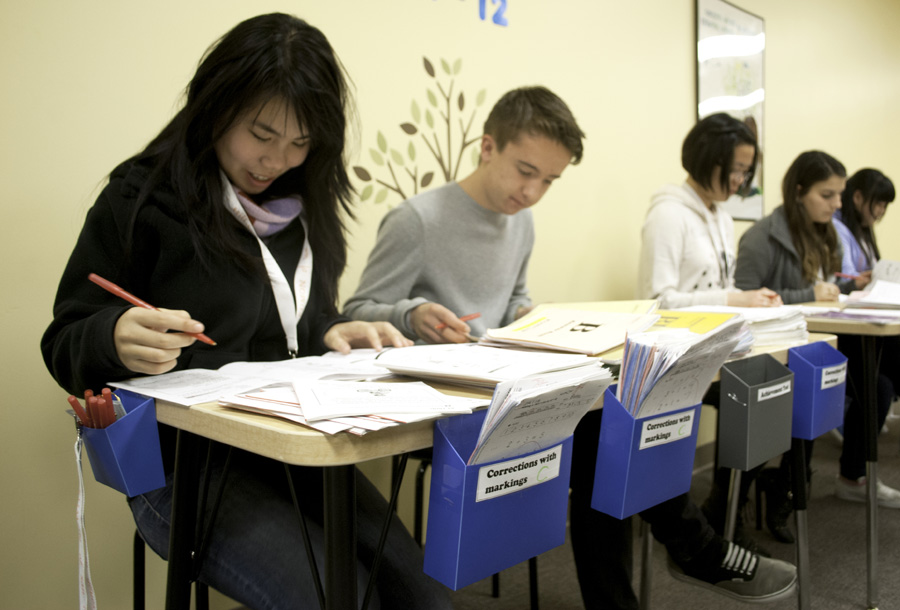
Every Sunday morning, sophomore Elaine Hsu rises at 6 a.m., grabs a quick breakfast, and heads to Sibby’s Cupcakery in downtown San Mateo. She cheerfully greets her coworkers, hangs up her jacket, and starts working on the cupcake orders for that day.
“I’m a cupcake decorator, so I actually frost and pipe the cupcakes by hand,” says Hsu. “You really get to put your own style and decide what goes on each order and individual cupcake, so it’s awesome that you have a lot of freedom with creating the businesses’ image.” Hsu is one of the many employed students at Aragon High School. Like Hsu, many students choose jobs which reflect their own interests.
“I worked at the Bay Shore Animal Hospital, and I chose to work there because I was interested in the field of biomedical engineering,” says sophomore Catherine O’Brien. “I think this job will definitely help me in college because it was experience in a field I’m interested in majoring in.”
Still, some students find their job choices to be limited.
Sophomore Netta Wang says, “I work at Kumon Learning Center because I like to work with younger kids. Not a lot of people will hire 15-year-olds, so I’m pretty lucky to have this job.” Many businesses are hesitant to hire high school students due to laws which restrict job opportunities for minors. All employees must also pay taxes and are entitled to minimum wage, but for high school students, the tax process is slightly different from adults.
Junior Erin Hull, a lifeguard at the Highlands Recreation Center, says, “I don’t pay taxes like the kind our parents do during tax season. When I first got hired, I filled out a form and now when I get my paycheck, the taxes are already taken out.”
Similarly, Wang says, “The taxes come out of my paycheck, although I can fill out a tax reform at the end of the year to be reimbursed, which I think is right to do since we shouldn’t have to pay for taxes on such a low-wage job.” Typically, students can fill out a W-2 form for tax returns. In this form, students check off boxes which identify them as minors and dependents of their parent or guardian’s income. At the end of the year, students may file for tax returns and are refunded the deductions for certain taxes such as disability taxes.
Additionally, employment offers students the opportunity to work alongside adults. Hsu says, “My job really is a ‘real adult’ job and all my coworkers are in their 20s, 30s, and 40s—most graduated high school the year I was born.”
For many, jobs are also beneficial in embellishing academic resumes and amassing funds for the future. O’Brien says, “I know a lot of students who work just for the sake of throwing it on a college app.”
However, many students still work in order to provide a source of income. Sophomore Jessica Sushansky says, “I work at the lunch line at Aragon. I chose to work their because it’s just at school and I don’t have to drive or walk anywhere to my job. It is helping me pay for college.”
For many, earning an income is not always enjoyable. Junior Darrell Ten, a Kumon employee, says, “My job can get a little tedious, but of course I can’t complain because I am getting paid. Grading worksheets is not the most fun [thing to do].
Ten still appreciates the opportunity to work. He says, “My job really taught me how to manage time, push my patience, and learn to be nice even if it isn’t a good day.”
Wang says, “[Work] can get very tiring at times, and it takes time away from schoolwork.”
Conversely, Hsu says, “I only work one day of the week, Sunday, so there really isn’t too much juggling.”
For high school students, employment opportunities, though limited, offer equal responsibility and often require considerable time commitments. Hull concludes, “Some of the people that work at the pool are actually adults, so we can see the difference between how often we work and how often they work. But other than that, I don’t think that my job is any less ‘real’ than my parents’. At my work, it’s mostly high school students and we get treated and paid just as fairly as the adults do. They respect us.”




